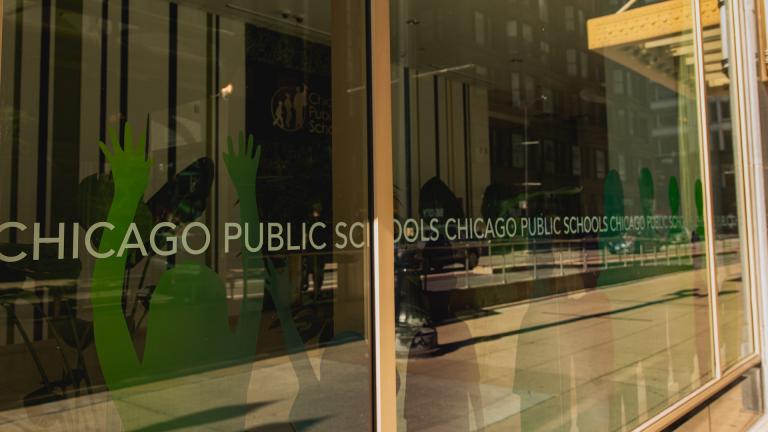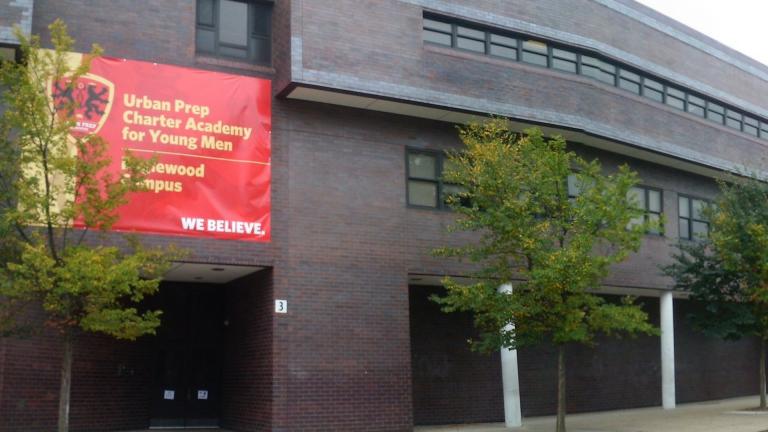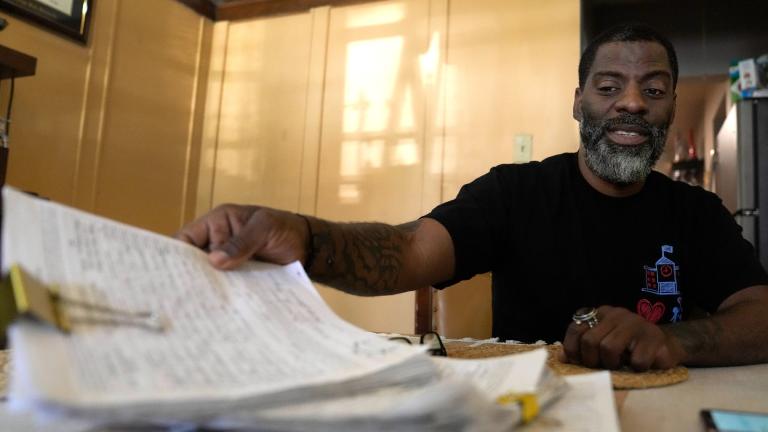Video: Joining “Chicago Tonight: Black Voices” is Jessica Cañas, senior community engagement manager at Kids First Chicago; Natasha Dunn, founder and executive director of Black Community Collaborative; and state Rep. Ann Williams, who represents parts of Chicago’s North Side. WTTW News invited the city of Chicago and the Chicago Teachers Union to join the discussion. CTU declined; the city did not respond. (Produced by Paul Caine)
Chicago is on the path to getting the hybrid school board preferred by Mayor Brandon Johnson.
The Illinois Senate on Tuesday approved legislation finalizing the transition to an elected school board. On Wednesday, the bill passed out of a state House committee. A vote is expected before the full Illinois House of Representatives.
The structure will allow Johnson to keep control of the board until 2027, by giving the mayor, a former Chicago Teachers Union organizer, the power to appoint a Chicago Board of Education president and 10 of its 20 board seats.
Chicago residents would choose the other 10 members in November’s general election.
Ald. Gilbert Villegas (36th Ward) told state senators during a committee hearing that the setup was a gift to the CTU, which fought for an all-elected board when Johnson’s predecessor, Lori Lightfoot, was mayor.
“The Chicago delegation in Springfield is not listening to their constituents. The hybrid school board is not a fully democratic process. Make no mistake this is a CTU PAC bill,” Villegas said, in reference to the powerful union’s campaign arm.
The CTU was the top contributor to Johnson’s 2023 campaign.
Villegas indicated the union wants time to rebuild its coffers.
“They don’t want to spend or have money to spend on 20 elections,” Villegas said. “Make no mistake, this hybrid CTU PAC bill is not what the residents of Chicago want.”
“The current CPS appointed board is out of control. The 10 appointments on this bill would reflect the current chaotic board makeup that are acting as activists, attacking community choice, wanting to eliminate charters, selective enrollment, magnet schools,” Villegas said.
The CTU declined to comment.
The mayor’s office did not return a request for comment, but during the hearing, Chicago lobbyist Derek Blaida said the proposal “allows the Chicago school district to continue to transition responsibly, from one under full mayoral control to one that is under the full control of those who vote in the November 2024 and subsequent general elections after that. I can think of no better outcome.”
Blaida was the only person to speak in favor of the compromise bill, though other unions joined the city and the CTU with going on record in support, including the Illinois AFL-CIO, SEIU Local 73, the Chicago Federation of Labor, the Illinois Education Association and the Illinois Federation of Teachers.
They were outnumbered by 80 registered opponents, many Black Chicago residents who said this move represents candidate and voter suppression.
“We’re going backwards,” Valerie Leonard said, calling the framework convoluted.
Austin resident Dwayne Truss said “Black folks on the West Side of Chicago” like himself are “tired of being overlooked, disinvested in, taken for granted.”
He said it feels “disrespectful” that the bill culminated without full transparency after the many hours of advocacy he and other CPS parents put into working on it.
Truss, a former member of Chicago’s Board of Education who’d been appointed by Lightfoot, said CTU leadership “crafted this bill to their benefit, versus democracy” which is “just straight-up hypocrisy from the mayor as well as the CTU leadership as well as the current board president (Jianan) Shi.”
“The people of Chicago do not want a hybrid school board,” Shi wrote in a November 2020 tweet demanding an elected school board.
Senate President Don Harmon said he still believes a plan adopted by the Senate (House Bill 2233) in November — that would have this year had voters elect the entire board — is the “superior” and “better” option, but that he moved the “inferior” half-appointed/half-elected measure (Senate Bill 15) at Johnson’s request and because it became clear the House wasn’t going to adopt his preferred version.
“The only way to advance this agenda before we run into deadlines for candidates to start circulating petitions for fall elections was to present to you all Mayor Johnson’s recommended compromise,” Harmon said. “There is no particularly artful way to transition to a hybrid school board. There’s no perfect answer.”
Harmon said it was becoming urgent to act, given the legislature’s self-imposed deadline of April 1 to decide long-simmering questions about the elected school board’s format.
Gov. J.B. Pritzker in 2021 signed a law (Public Act 102-0177) moving Chicago’s mayoral-appointed school board to an elected one, like all other Illinois school districts. The law also put a moratorium on public school closures in Chicago until 2025.
At Lightfoot’s urging, that underlying law called for a hybrid board in 2025 before shifting to an all-elected body in ’27, following the 2026 election cycle. But the law left unresolved structural matters like the shape of districts and how the inaugural election of a hybrid board would work.
The legislation advancing in Springfield settles those mechanical ambiguities.
The General Assembly’s model divides the city into 20 districts.
For the 2024 election, those districts will be folded into ten.
“Two of the 20 districts will be each paired into one larger district,” Harmon explained. “Everyone in the city of Chicago who is registered to vote is invited to vote in the election and will be represented by the person they vote for in the first two years.”
Johnson must then appoint someone from the other half of the super-sized district, which is meant to ensure there’s representation from each of the original 20 districts.
Both the elected and appointed members will serve two-year terms, starting Jan. 15, 2025.
The Senate passed the measure 37-20, with two Democrats — Sara Feigenholtz of Chicago and Laura Fine of Glenview — joining Republicans in voting no.
Sen. Mattie Hunter, a Chicago Democrat, voted for it despite reservations. Hunter called the process “strange” and noted that representatives from the CTU and the city hadn’t engaged much with her about it, making her think it was an already-settled “quid pro quo.”
“This is a very difficult vote for me,” Hunter said. “I’m very concerned.”
“My district has not recovered from the 50 schools that were closed several years ago,” said Hunter, a CPS graduate and member of a local school council for her alma mater, Daniel Hale Williams Preparatory School of Medicine.
Senate Republican Leader John Curran criticized the school board map as “gerrymandered” because the districts were drawn by Democrats in the state legislature.
“I have and will continue to vote NO on any legislative or school board map drawn by politicians, rather than the people they represent,” Curran said in a statement. “We stand with the thousands of opponents, citizens, parents, students, and teachers who want to end the process of gerrymandering that suppresses choice and disenfranchises voters in Illinois.”
The measure also creates a board committee dedicated to improving education opportunities for Black students.
The Black Student Achievement Committee is to be focused on providing Black students “with the maximum opportunity for success in areas where research shows there has been chronic underperformance of African American students in their elementary and secondary education experience.”
Contact Amanda Vinicky: @AmandaVinicky | [email protected]






